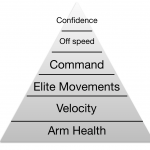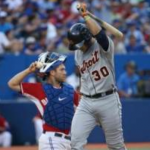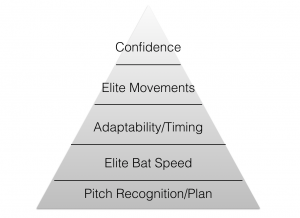5 components of being a great hitter
In my crusade to fight traditional batting practice, I have compiled and/or created 24 drills specifically designed to improve each of the five areas on our hitting success pyramid. We spend a lot of time talking mechanics, but how much time do we work on the other aspects of the pyramid?
Pitch recognition/plan
Perhaps the most important of all of the aspects of our pyramid. Without good pitch recognition and a good plan at the plate, all other aspects of the triangle are obsolete. Imagine a hitter with great mechanics/movements and elite bat speed to takes fastballs down the middle, swings at breaking balls out of the zone, and chases high fastballs because they can't recognize pitch spin/type or location.
Get a sample of our 'chaos hitting drills" here
Elite bat speed
There is not a player on the planet who wouldn't benefit from more bat speed. Even Aaron Judge, Mike Stanton and Mike Trout would benefit from hitting the ball harder, they would hit more home runs and more for the balls that stayed in play would be hits. Elite bat speed also allows hitters to see the ball longer before committing to swing, and helps them hit elite velocity.
Adaptability and timing
I believe that there haven't been two pitches thrown that are exactly the same. They haven't had the same release point, release angle, velocity, spin rate, movement, and ending location. Because of that, it is important that hitters are adaptable and don't learn a swing, but learn many swings and many different ways to deploy their timing.
A famous saying is "hitting is timing and pitching is upsetting timing." Again, elite bat speed, elite pitch recognition does no good if the hitter is early or late on the pitch.
Get a sample of our 'chaos hitting drills" here
Elite swing movements
Notice I didn't say "elite mechanics." That's because that sounds too... mechanical. Plus, there is no time for hitters to have any cognitive thought while swinging, therefore putting "mechanical" thoughts in their head will only interfere with their performance.
I used to think hitters could have one mechanical thoughts, but now I am of the opinion that one is too many. I believe in implicitly training hitters so that they figure out their own movement patterns.
Generally, the movement patterns we are looking for is a negative move with the hands during the stride, knob facing the catcher's feet at the top of the load, rotation starting from the ground up, and a slight up swing path.
Confidence
Confidence comes from many different areas, while success is certainly one of them, so is progress. By giving players complex tasks and having them figure them out, and getting better at them, they begin to gain confidence in their abilities to solve "hitting problems."
I used to be a believer that "meatball" batting practice was a good way to build confidence, but I have since come to realize that is likely false confidence, because as soon as the task gets difficult, the player fails. Since they haven't been challenged, they are not likely to know how to respond to failure.
Summary
Start building this pyramid from the ground up, but by setting up outcome oriented drills, it allows hitters to work on all aspects of the pyramid at once, or in one session. Traditional instruction where the coach gives a cue (that may or may not resonate with the player) and the player thinks cognitively to make corrections often allows hitters to only make on correction at a time.
Then once the hitter moves on to another correction, or when they move to competition, they will often lose the previous skill they learned.
Our 24 Chaos Hitting Drills allow coaches to set up drills and hitting sequences that will let players implicitly attack the pyramid of success by putting them in situations to work on pitch recognition, timing, plan at the plate, improve bat speed, and improve their movements all while building confidence that they can solve complex problems.
If you are not an Elite Member, you can access a sample of these hitting drills, along with our video to success on the batting tee...
Get a sample of our 'chaos hitting drills" here
More from my site
 Scoring Runs Without Hitting Part III
Scoring Runs Without Hitting Part III Mini – Why the player making more errors may be the better defender
Mini – Why the player making more errors may be the better defender CCA Podcast 106 – 7 things baseball players SHOULD do in the weight room
CCA Podcast 106 – 7 things baseball players SHOULD do in the weight room CCA Podcast 055: How to do a post season program evaluation
CCA Podcast 055: How to do a post season program evaluation CCA Podcast 158 – The Pitching Pyramid
CCA Podcast 158 – The Pitching Pyramid Mini – Playing the game the right way
Mini – Playing the game the right way
 Posted by Kyle Nelson
Posted by Kyle Nelson- Posted in Hitting
 Jul, 22, 2018
Jul, 22, 2018 No Comments.
No Comments.
Elite members login here
Check out what’s New/Hot!
Recognizing, Diagnosing, and Fixing Common Hitting Flaws eCourse The 3 metrics we tested on Blast motion sensors this year Sneak Peek Inside an Elite Q and A The batting practice continuum Elite Member’s area table of contents 50+ “Chaos” hitting drills
5 sample Chaos hitting drills FREE
Mental Skills and Culture Building The hitting pyramid Welcome Elite Member, Trey! Ideas for a pitcher first practice 12 week bat speed improvement plan Make plans this offseason to have your team playing their best baseball at the end of the year” Top 5 hitting drills to translate practice skill to game performanceHow we used Blast Motion sensors with a team in 2019
What to do if your hitters are overmatched Welcome Elite Member, Tommy! Setting your baserunners up for success Welcome Elite Member, Mike! A consulting call with Elite Member Matt FREE Web Clinic: Developing Athletic, Consistent, Extraordinary Infielders
 Coach Kyle Nelson
Coach Kyle Nelson